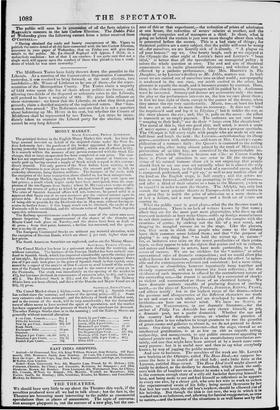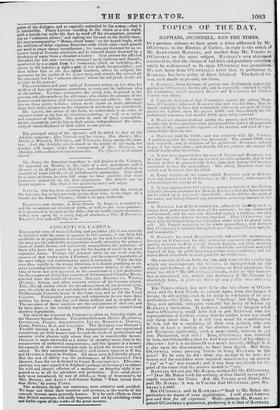THE THEATRES.
WE should have very little to say about the Theatres this week, if the novelties produced were all we had to talk about ; but the fact is, the Theatres are becoming more interesting to the public as commercial speculations than as places of amusement. The topic of conversa- tion amongst playgoers is, not the success of a new play, but the sue-
cess of this or that experiment,—the reduction of prices of admission at one house, the reduction of actors' salaries at another, and the change of companies and of managers at a third. In short, what is Fotng on behind the curtain is just now more thought about than what is presented before the scenes. This is a bad state of things; for theatrical politics are a sorry subject, that the public will soon be weary of—for ourselves, we are heartily sick of it already. " A plague on all your houses !" say we. One hearty laugh, such as we enjoyed at the Olympic the other night at LOVER'S farce and LISTON'S " beau ideal," is better than all the speculations on managerial policy : it solves the whole question at once. The end and aim of theatrical amusements is to excite pleasurable emotions ; and whether that is effected by a pathetic performance, like Mrs. Hooesa's in The Daughter, or by LISTON'S drollery as Mr. Dibbs, matters not. In both cases we are carried out of ourselves into an ideal world ; our sympathy is awakened in the one case, our mirth excited in the other, but pleasure is equally the result, and it becomes greater by contrast. Here, then, is the clue to success, if managers will be guided by it. Audiences must be interested. Scenery and dresses are accessories only : the more the play or the performance interests us, the less we care about them ; in fact we lose sight of them, except in the pauses of the drama, when they amuse the eye very satisfactorily. Music, too—at least the kind that we get now—is no more than an accessory. It does not " take the imprison'd soul and lap it in Elysium ;" but it tickles the ear, as the show pleases the eye ; and, like it, palls on the sense : the effect is transient as an empty pageant. The audience are not sent home " weeping to their beds," nor do their " lungs crow like chanticleer." The moral of this is, that one good play, well acted, is worth a score of noisy operas ; and a lively farce is better than a gewgaw spectacle. The Olympic is full every night with people who are made to cry one half-hour and laugh the next : the Lyceum—notwithstanding its cheap prices—overflows with audiences—and tears at Mrs. CRAMER'S exem- plification of a woman's faith : the Queen's is crammed to the ceiling by people who, after being almost pained by the truth of MITCHELL'S personation of an idiot boy, are convulsed by the imperturbable im- pudence with which WRENCH brazens out a lie : at Covent Garden there is Power of attraction in one actor to fill the theatre, by virtue of his natural humour alone (it is not surprising that people should flock to see one man act naturally when he is ahnost the only one) : anti Drury Lane, in the third week of a successful opera, which is composed, performed, and "got up," as well as any modern affair of the kind on the English stage, is half empty ; and the actors are fain to come forward—without any prompting, in this act, of course— and offer a third of their salaries as a loan to the Manager, (when to be repaid ?) in order to save the theatre. The Adelphi, too, only last season the most popular theatre in Europe—with a set of scenes to one piece that is worth the price of admission as a mere show—is at last a failure, and a new manager and a fresh set of astors are coming in.
What the public want is good plays—what the the theatres want is good dramatists. There is no lack of writers known by that name ; albeit they are for the most part mere playwrights, who dress up old worn-ont materials as boys make Guys—coble up foreign manufactures to suit their notions of English taste—and play the vampire with the creations of genius, by sucking out the life of a new novel, and draggi»g its mangled carcase on to the stage. Like the players, too, they seem to think that people who come to the theatre leave their common sense behind them ; and that ",the purpose of playing " is any thing but " to hold the mirror up to nature:" for, as imitators ever seize on the worst peculiarities of their proto- types, so they appear to take the defects that genius and wit in authors, and nature and humour in actors, have made pardonable, to be the causes of success. We are no sticklers for the " unities," or other conventional rules of dramatic composition ; and we would allow 'the widest licence for invention, provided always that the effect be agree- able and the extravagances coherent and consistent : but a mere string of horrors or absurdities, however ingeniously hung together and cleverly represented, will not interest the least reflecting; for the vividness of each impression is effaced by the contradictory nature of the succeeding one,—the reason is assailed by a succession of shocks as violent and unconnected as those of an electrical battery. We have dramatic authors capable of producing dramas of sterling merit,—as the plays of KNOwl.Es, POOLE, JERROLD, KENNY, PEAKE, and others testify : but in the highest range of the drama—where the passions and idiosynenicies of the different characters are made to act and react on each other, and are developed by means of the incidents—we have no master mind. We have no SCOTT, or BYRON, or Wonnswortrii, in our dramatic literature,—for the author of Philip Van Artevelde has only shown himself, as yet, a dramatic poet, not a poetic dramatist. Whether the age and the country lack dramatic genius, or whether the guerdon of dramatic fame is too valueless to tempt greatness to run the gauntlet of green-rooms and galleries to obtain it, we do not pretend to deter- mine. One thing is certain, however—that the stage, viewed as an intellectual gratification, is at as low an ebb as regards acting, authorship, and management, as any public amusement appealing to rational people an well be. This is an unsatisfactory conclusion cer- tainly, and one that might have been arrived at by a much more sum- mary process : but it is useful now and then to say what everybody knows, by way of jogging the public memory. And now to business. The novelties of the week are Mr. LOVER'S new burletta at the Olympic, called The Beau Ideal—we suppose be- cause the hero is in search of an ideal belle; and a little farce at the Lyceum, entitled Stage-struck. The Beau Ideal itself might almost Is easily be defined, as the drollery be described, which shook. the audi- ence with fits of laughter so as almost to make a toil of merriment. It is the common enough story of a silly old bachelor fancying himself in love, and being made to see and feel himself as ridiculous as he appears to every one else, by a clever girl, who sets her wits to work to sicken the superannuated swain of his folly ; being moved thereunto by her fear lest her own lover, the old boy's nephew, should be elbowed out of his heirship. But though the idea is not new, the way in which it is worked out is so ludicrous, and, allowing for farcical exaggeration, so true to nature,.—.and the humour of the situations is so well borne out by the point of the dialogue, and so capitally embodiei in Cite acing,—that it is irresistible. Fancy LISTON standing in the street on a wet night, with a hearth-rug under his feet to ward off the rheumatism, serenad- ing an "unknown adorer," and sighing out his soul on the double-bass; his man accompanying " Home, sweet home" on the keyed-bugle, with the addition of those vigorous flourishes with which stage-coach guards are used to rouse sleepy turnpikemen ; his harmony drowned by an in- trusive band of German minstrels, and he himself almost drowned by a discharge of water from a chamber-window ! Next picture the afflicted Strephon the folh win morning, wrapped up in nightcap and flannels, comforted by a pima from 11-s inamorata, which on unfolding, dis- closes to his wonder,' g sights pair of red plush inexpressibles ; and then follow him to the Zoo ogled Gardens, where he eclipses the paroquets by the scarlet of his newer man, and attracts the eyes of all the company but his " unkown adorer," whom the red plush smalls are to rivet to his person ! The earnestness and good faith of Liarroses acting, no less than his drollery of face and manner, contribute to carry out the ludicrous idea of the author. VESTRIS personates the young lady, disguised as the servant, and afterwards as the old crone, who claims the promise of the horror-struck bachelor, with her usual archness and address. She sings two or three pretty ballads; whose merit shows to more advantage from their being apropos to the situation in which they are introduced. Mr. LOVER, the author of the farce, we understand, is an artist of superior talent in the line of miniature-painting, as well as a writer and composer of ballads. His merits in each of these accomplish- ments, separately, entitle him to high praise, independent of the versa- tility of talent displayed in their union in one person.



























 Previous page
Previous page